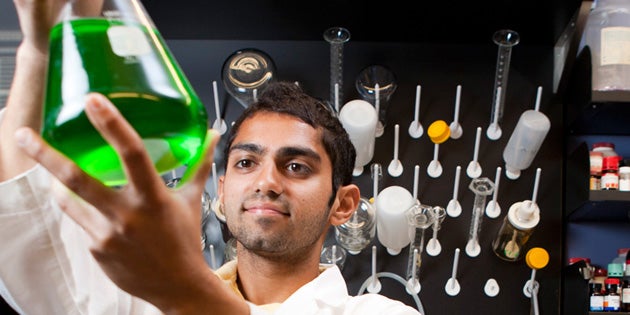An innovative, sustainability-minded company from Summerville, S.C., that recycles chemical waste, among other services, was looking for a key ingredient to take its business to the next level: chemists.
In 2013, Innovative Resource Management (IRM), reached out to the College of Charleston Department of Chemistry and Biochemistry to find student-interns to serve as the company’s chemical specialists.
So far, four chemistry students – Will Shuler, Brett Snyder, Sean Flanagan and Brenna Norton-Baker – have participated in the paid-internship program.
In fact, the arrangement has been so successful that Snyder and Flanagan, both graduating seniors, have accepted full-time positions with IRM.
“The purpose of the program is to give our students exposure to chemistry outside of an academic environment,” said chemistry professor Neal Tonks, who worked closely with IRM’s vice president for business development, Ned Foster, to develop the program.
Through the internships, the students have gained deeper insight into the complexities of environmental stewardship for products and byproducts from the chemical industry, Tonks said.
RELATED: Learn 6 Ways to Ace Organic Chemistry.
Snyder, who grew up in Fort Mill, S.C., started his internship in 2012. He found it exciting to put his chemistry knowledge to use and to be looked upon by others as an expert in his field.
“We would sit in on business calls as ‘the chemists,’ providing any insight when needed, and we would do research into some of their chemical streams to see what processes we could come up with to add value to the by-product/waste streams,” Snyder said.
Flanagan enjoys the challenge of analyzing chemical byproducts to identify ways they can be modified for use in new applications.
In addition to research and lab work, Snyder and Flanagan also bring their chemistry knowledge to bear on the business side. As they work to identify new uses for waste products, they try to be cognizant of the fact that IRM is a business and that the chemical tweaks they undertake must be practical and financially feasible.
“I really enjoy talking to the chemists at the chemical companies because we know the vocabulary,” Flanagan said. “We always make sure to ask them what type of waste streams they may be able to use down the line.”
Foster said college-age students with chemical know-how are ideal interns and employees because their generation is keyed on sustainability and finding careers that can make a positive difference in the world.
“Our goal is to reduce the amount of waste materials going into landfills,” Foster said. “We need students who have chemical knowledge and are passionate about sustainability.”
The internship program is just the beginning of what Foster and Tonks hope will become a long-lasting relationship that promotes environmental stewardship while providing students and graduates with real-world work experience.
As he prepared to graduate last week, Snyder reflected on his experience at the College and how professors such as Tonks and Rick Heldrich helped prepare him for a career in chemistry.
“After practically living in the new science center to write lab reports and working 10 to 15 hours a week in the lab doing ‘real’ experiments, I truly started to feel like a chemist.”







